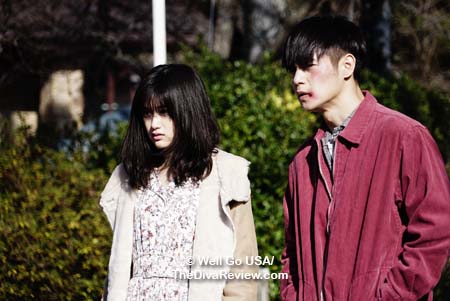
After over 100 projects over 30 years, Takashi Miike has more than earned his status as one of the one of the world's most celebrated and fascinating directors. Unrestrained by style, genre, or "good taste," Miike has fearlessly made the films he's wanted to make, true to his singular vision, and shows no sign of slowing down.
His latest, FIRST LOVE, is a fully-loaded, eye-popping, wickedly hilarious spin on his familiar yakuza stomping grounds. Director Miike chatted exclusively with LMD about mixing romance and gangsters, stupid yakuza, putting women at the forefront, and the joy of remaining unevolved.
Dig it!
FIRST LOVE
Takashi Miike

 The
Lady Miz Diva: Itís called FIRST LOVE and it does seem that the
attachment of the young couple is what gets them through the insane
violence that explodes all around them.
The
Lady Miz Diva: Itís called FIRST LOVE and it does seem that the
attachment of the young couple is what gets them through the insane
violence that explodes all around them.
How did you know this strangely touching romance would work in the midst of this craziness?
Takashi Miike: Absolutely. Now, in this film, you have these kind of rather stupid yakuza people that are kind of the scum of society. Itís what they are considered. But even within yakuza, you have several different types of yakuza: You have your weakened yakuza that ends up being the brunt of the joke. You have the yakuza that takes the money and runs. You have the yakuza that is fighting for their own pride. You have the yakuza thatís really just in it to band together the organisation. And all those different yakuza subtypes; they are all trying to just live. They are all basically trying to just get by. They all end up dying in this film, right?
But what happens is, what I see is that now in Japan, the laws prohibiting criminal activity have changed; so that the old type of yakuza -- like the cool yakuza that kind of had a sense of honour, and that had some redeemable qualities, really canít exist anymore in Japan. They canít survive.
And so, you have this historical background, but also, you have these unnecessary criminal kind of scum organisation within the film that creates this story, that even though they {Leo and Monica, the protagonists} may not be doing anything great for society, per se, within the film; because they are there, and they have this little story, and this scuffle, and this adventure, this love is born between this couple. And so, that is why this story led to love.
Thatís why I decided I wanted to make this film and call it FIRST LOVE, because thatís what was born out of all of this insignificant chaos thatís in the background.
 LMD:
While youíre speaking of cool yakuza, Iím impressed by the women in the
film; particularly the Chinese triad assassin, who came to Japan because
she loved the idea of honourable yakuza. Was her character born out of
what youíve just said about the state of yakuza today?
LMD:
While youíre speaking of cool yakuza, Iím impressed by the women in the
film; particularly the Chinese triad assassin, who came to Japan because
she loved the idea of honourable yakuza. Was her character born out of
what youíve just said about the state of yakuza today?
In addition to that, with so much of action cinema being male-driven, was your placing the three main female characters; that triad member, the vengeful pimpís moll, and our heroine in such strong roles a conscious effort to show women in the forefront?
TM: So, at a glance, you see the male yakuza types -- the traditional, strong yakuza types -- but in reality, what happens is that all of them, through meeting the protagonist {Monica} Ė through their encounter with her Ė their lives are drastically changed, right? At the same time, she meets this guy, and her life, and their lives are drastically changed, as well, because of that encounter. So, really, they become this kind of inseparable part of this connected flow of events. Itís all inseparable in my mind.
But you mentioned those three types of strong women characters in the film, the Chinese yakuza -- the hit woman -- and honestly, when we were looking at the script, that character was originally a male.
We rewrote that character several times, over and over again; and it was actually kind of a Chinese mafia-type guy that was admiring the traditional Japanese yakuza, and then we just decided that we needed to switch that to a female character, because there were two women to contrast the male characters of the film with, and we decided that was just not enough: We needed one more strong female character in there to make it interesting, and make it all fit well together, and give enough contrast for the film to work well.
 LMD:
This movie is hilarious. In some parts, it felt kind of like your
version of a Warner Brothers cartoon in its wackiness, mixed with an
over-the-top, twisted sense of humour.
LMD:
This movie is hilarious. In some parts, it felt kind of like your
version of a Warner Brothers cartoon in its wackiness, mixed with an
over-the-top, twisted sense of humour.
How do you gauge when moments like the granny getting the KO, or Shota Sometani getting high from rubbing heroin into a bullet wound are actually funny, or when itís maybe too far?
TM: Itís interesting because I donít actually make that judgment call, myself. I mean, at the end, it ends up being me thatís responsible and making the final decision of what goes in the film, and what to leave and what to take out; but I really kind of leave that up to a combination of the character and also the personality of the actor thatís acting the character.
And so, if itís Kase, being played by Mr. Sometani, I mean, he probably has respect for his own grandma, and his mom, and other women in his life, but if heís pushed too hard or too far, well then, heís gonna hit a grandma, right? So, if you stick him in this ridiculously difficult positionÖ And that comes down to the character, and also the personality of Shota Sometani, right?
I donít intervene that much. I really kind of let them become the character, that they feel like, ĎOkay, if this is their character, this is the kind of character this person is within the film, so this is what they would do,' and I let them really take that to whatever extreme they feel like is appropriate.
I donít intervene, because I feel like if I control that, if I start controlling how far a character can go and how far they canít go; they will just not come to life. They need to come to life. So, I donít make the decision about where to stop the violence, or whatís too far, or not too far; I really leave it up to the character, and let the character become whatever they are supposed to become.
 LMD:
Perfect segue, because we see Sometani-san in this wild role, and your
lead, Kubota Masataka playing very differently to anything weíve seen
before. Youíre known for bringing out new sides to actors. Have
you ever had an actor say, ďI canít do it,Ē or ďThatís too far,Ē and how
do you help them through it?
LMD:
Perfect segue, because we see Sometani-san in this wild role, and your
lead, Kubota Masataka playing very differently to anything weíve seen
before. Youíre known for bringing out new sides to actors. Have
you ever had an actor say, ďI canít do it,Ē or ďThatís too far,Ē and how
do you help them through it?
TM: You know, luckily, Iíve never really come upon that situation. Iíve never met an actor in my career that wasnít willing to do that. I feel like if I canít give absolute freedom to an actor to really get their own idea of what they want it to be -- even if I give them absolute freedom -- if they canít get into it, then I donít think theyíre really fit to be an actor. But at the same time, Iíve really never come across that situation. Usually, they just come alive in that situation. I give them freedom to just come alive and be who they think that person is supposed to be.
Iíve filmed a lot of genres, and I also film a lot of violence; Iím really not making a ton of family films {Laughs}, and so Iím kind of known. So, the actors who Iím working with kind of also know who I am as a director -- that may be also a factor {Laughs}.
But, I think, in a sense, they may have abilities and skills as an actor that are still dormant; that they are not aware of, yet, and when they have a chance to do that, they are just going to have fun. Part of this is has to do with their ability to just enjoy life -- just enjoy life, and go with it, and have fun in any situation. So, I really havenít had that situation at all. Iím very lucky as a director.
But at the same time, if I ever did find an actor like that, I would not force them to play a role, or to do something that they didnít feel comfortable with.
 LMD:
If I hadnít known FIRST LOVE was a Miike picture, I wouldíve thought,
ĎWhat 20-year-old directed this?í Thereís such freshness and energy.
With your films, regardless of the style or genre, there is always this
passion and exuberance that leaps off the screen.
LMD:
If I hadnít known FIRST LOVE was a Miike picture, I wouldíve thought,
ĎWhat 20-year-old directed this?í Thereís such freshness and energy.
With your films, regardless of the style or genre, there is always this
passion and exuberance that leaps off the screen.
After making so many films, where do you get that energy from, and what inspires you to work so prodigiously?
TM: {Laughs} First of all, thank you. Iím so happy to hear that that was your impression of the film. At the same time, in terms of where I get that energy and freshness from, I think for 30 years -- Iíve basically been a film director for 30 years at this point -- and I havenít evolved at all.
I feel like most directors think, ĎOkay, in 30 years, I want to be doing this. I want to do that.í Thereís this evolution process. They have their career goals, and they have this ideal film that they wanna make, and ĎThis is where I want to go,í and I havenít really evolved or changed at all in 30 years. So, thatís part of it, but I always feel like Iím still at the starting point. Iím still at the starting line.
We have Directorís Week at Cannes Film Festival, right? And the Directorís Week at Cannes Film Festival, is kind of like they have all these young directors that are just starting outÖ and then thereís me. {Laughs} And so, thatís really like the gate; thatís like the gate to just start their journey. Theyíre just getting through the gate to start their journey, and yet I get invited to that.
But to me, thatís important; to be able to mingle, and to hang with those kinds of people is actually very important to me. So, maybe thatís where itís from?
~ The Lady Miz Diva
Sept. 17th, 2019
© 2006-2022 The Diva Review.com
|
|






















